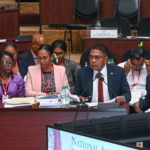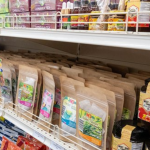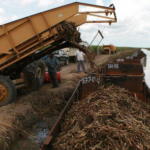Extension Officers and other stakeholders in the agriculture sector will, over the next five days, participate in an extensive training exercise on efficient fertilizers, biofertilizers, and nutrient management.
The workshop which is being held at the Guyana School of Agriculture’s auditorium is being conducted by the United States Agency for International Development (USAID). The training is intended to address the need to examine how fertilizers are used and applied within the sector across the region.
Several countries in the region including Trinidad and Tobago, St. Lucia, and St. Vincent and the Grenadines have already benefited from similar training exercises.
The training exercise was also developed to be aligned with the Agriculture Sustainable Goals and Priorities within the CARICOM region, CARICOM’s Vision 25 by 2025 Regional Food Security Initiative’s targets, and Sustainable Development Goal 2 (Zero Hunger).
While delivering remarks at the launch of the workshop, Agriculture Minister, Honourable Zulfikar Mustapha underscored the importance of the exercise and how it can transform healthy food production efforts in Guyana and across the region.
Minister Mustapha further stated that inputs such as minerals and biofertilizers function as key players in sustainable agriculture by improving soil fertility, plant tolerance, and crop productivity. While noting that fertilizers were developed to improve the quality of fruits and seeds, thus leading to better harvest and earnings, Minister Mustapha said that the ministry’s extension service would have to play a significant role in the efficient use of such.
“Efficient use of nutrients can be achieved by the adoption of best nutrient management practices. This is achieved when the right fertilizer product is selected and applied in the right amount and at the right time and place to match plant needs and reduce nutrient losses. More so, efficient use of fertilizers will aid our farmers greatly as they would reduce their cost of production and increase their yields. For this initiative to be successful, we need our extension officers, who are the important link between the government and the private sector, to be proactive; and to extend our reach and services into every village, region, and to every single farmer in Guyana,” he noted.
He further stated that collective efforts must be made to improve agricultural productivity and farm performance, particularly in the regions where food is more needed, adding that this should be done in a manner that is sustainable so as to ensure food security is not jeopardized.
While speaking on the government’s efforts to assist farmers with fertilizer inputs following supply challenges resulting from ongoing conflicts in countries like Ukraine, the minister also said efforts to utilize biofertilizers and other technologies should be accelerated.
“As a measure of this government to ease the cost of production, we have allocated over G$1 billion to farmers, and so far this has benefitted over 21,470 farmers. However, to address both the medium and long-term impacts, this increase in fertilizer prices should be used as a motivator to accelerate our innovations in the use of biofertilizers and other technologies, and policies in response to this rapid cost rise and discuss ways to mitigate the effects of increasing food and input price on the region,” he stated.
Extension officers from the National Agriculture Research and Extension Institute (NAREI), the Guyana Livestock Development Authority (GLDA), the Guyana Rice Development Board (GRDB), and other agencies are expected to participate in the workshop.
The event was also attended by US Ambassador to Guyana, Sarah-Ann Lynch, Assistant Secretary-General CARICOM, Mr. Joseph Cox, Foreign Secretary, Mr. Robert Persaud, USAID/ESC Regional Representative, Mr. Mervyn Farroe, and USDAID Representative, Mr. Khalil Ahmed and is expected to conclude on Friday.









